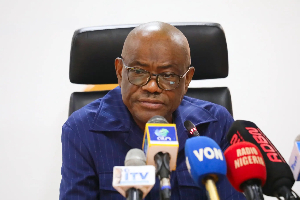No one saw 2020 coming as anything other than a normal year. Not our foremost scientists. Not even our first-rate, jet-owning prophets who speak with God every midnight. No prophet predicted the doomsday that 2020 would forever be remembered for. Not the Industrial Revolution, colonial era, or the World Wars, Cold War, or even capitalist democracy has united the world in uniformed participation and effect as the COVID-19 outbreak. Not even the Global Depression of the 1930s or Global Recession of 2008 could dare challenge the coronavirus in its effect on lives on a global scale.
Perhaps, when historians start recording their perspectives of 2020, only sports can rival COVID-19 in its global dominance. However, even sports might have to take a bow in the sense that COVID-19 triumphed over all its varieties with a pause brought to all sporting activities globally. The Olympics could not be held. The Premier League in England, La Liga in Spain, Bundesliga in Germany, Serie A in Italy and all over the world saw football shutdown. Similarly, all other sports, such as baseball, basketball, cricket, tennis, hockey, etc. all had to be shut down, at least temporarily. Businesses, banks, all events around the world had to be cancelled, placed on hold, suspended or postponed indefinitely.
Nigeria was not left out of the global pandemic, as it was eventually confirmed to be by the World Health Organisation perhaps a bit late. The country, after recording its first two cases, was thrown into panic with its virulent widespread, eventually culminating in the adoption of the global approach of lockdown, nationwide curfews from state to state, and restriction of working hours for staple food sellers while major businesses had to temporarily shut down physically. Social distancing, wearing of facemasks, refraining from handshakes, etc. became a trend. It became a crime to sneeze or cough in public or even at home. Going out was a risk while hosting visitors became even riskier.
However, while the measures above could be rationalised for countries in developed nations and maybe in some African countries, the same could not be entirely said of Nigeria. Certainly, the necessity and effectiveness of a nationwide lockdown in the country have been called to question by citizens all year long, and thus I would not be surprised if it became a subject of academic discussions subsequently. Meanwhile, a look back at how it started in the country, analysing the year in review would prove that Nigeria perhaps could have avoided the disaster of COVID-19 just as much as Donald Trump is being blamed for the same laxity in the United States. The tardiness, slow-wittedness and disastrous hesitation of both leaders (Trump and Buhari) in implementing proactive measures of performing their foremost duty-protecting the lives of their citizens-led to the death of many hundreds of thousands.
At the time when COVID-19 became known globally and there were yet no confirmed cases in the country, there were already warning cries from several quarters for the overtime proved figurine in Aso Rock to secure Nigeria and lock down airports while enforcing strict health checks on immigration. As it is characteristic of the Presdient, Major General Muhammadu Buhari (retd.), he played the game of deaf and dumb. Worse is the fact that a month or even two after it became global knowledge, Nigeria was still not in the least prepared to counter and prevent a potential outbreak in the country, let alone contain its spread. Not only did it speak ill of the country’s terrible healthcare system in dire need of heavy investment and productive attention, but also of the ineptitude and incompetency of the Buhari regime.
The consequences? Many have died. Even more, billions of naira have been wasted, siphoned, and converted into personal use by looters in the name of audio medicare. More intriguing is the fact that Buhari himself lost his closest allies. To the jubilant Nigerians, his Chief of Staff, Abba Kyari and newspaper publisher, Sam Nda-Isaiah’s death perhaps would pain him the most. Folks perceived both deaths as divine punishment or literal consequences for his carelessness and dormancy.
More deaths. Nigerians mourned global celebrities they have grown fond of such as Kobe Bryant, an African-American basketball legend; Chadwick Boseman, a legendary actor who kept representing and advocating for the black race through his exceptionality in the Hollywood; Jerry Rawlings, Ghana’s former and longest-serving president; Majek Fashek, a Nigerian singer and songwriter based in the US; and Diego Armando Maradona, Argentinian and global football star of “the hand of God” fame, among sundry others.
The death of higher education followed that of humans. While COVID-19 was responsible for the nationwide lockdown, tertiary education at its apogee was on lockdown. I wrote many times about this during the year. The ASUU strike is third on my list of national phenomena worthy of note in 2020, which I will be pinning on the government again. Disputes over unmet government promises of over a decade that have been renewed over time, logistics of IPPIS and unpaid arrears snowballed into the declaration of a two-week warning strike in March, and subsequently an indefinite strike amidst COVID-19. While the government has seemed to come to an agreement in the month of December with ASUU, the 10 wasted months in public institutions cannot be remedied for students. Their colleagues in private institutions on account of this year are already a session ahead of them, let alone adding previous ASUU strike actions. Many students have resorted to fraud, prostitution, or pecuniary trade in a bid to make money while losing focus on their academics. A student recently committed suicide at the University of Ilorin after losing N300 million to forex exchange trading. Where did he get the money from? You have to inquire after the odds of this happening if academic life had not been paused for avoidable reasons. Further, and perhaps a huge cause for concern, many are not even looking forward to resumption. The few who do only want to get their certificates and get out. The purpose of education in Nigeria is being defeated and the youth are gradually losing interest.
Fourth on my list is another matter I have hitherto contributed to in writing- the #EndSARS saga. The hash tag trended all across the world, prompting international investigation from Amnesty International, the BBC, CNN as well as local investigation by Premium Times. Many are said to have lost their lives, having become victims of the very ill they sought to correct from devilish policemen. The icing on the cake is the Lekki Massacre in which soldiers were deployed to put out the protest after all other means, such as bribing thugs to infiltrate the protests, failed. These soldiers, as evidence from sundry investigations have proved, opened live round magazines on peaceful protesters who were demanding that the government should protect their right to life. Instead, the hostile government killed more and failed to bring to book any of those responsible. Further, the government went after burying the truth, peddling false narratives one after the other, all of which were debunked. Authorities threatened witnesses, forcing DJ Switch -who had live-recorded the event on Instagram- to seek asylum in Canada. The President remains in power, Lagos State governor, Babajide Sanwo-Olu, has not resigned, The Chief of Army Staff, Tukur Buratai, has not lost his job, the soldiers got away with it, young lives were prematurely terminated, and SARS remains. What a tragic irony!
Opinions of Thursday, 7 January 2021
Columnist: Toyin Falola















